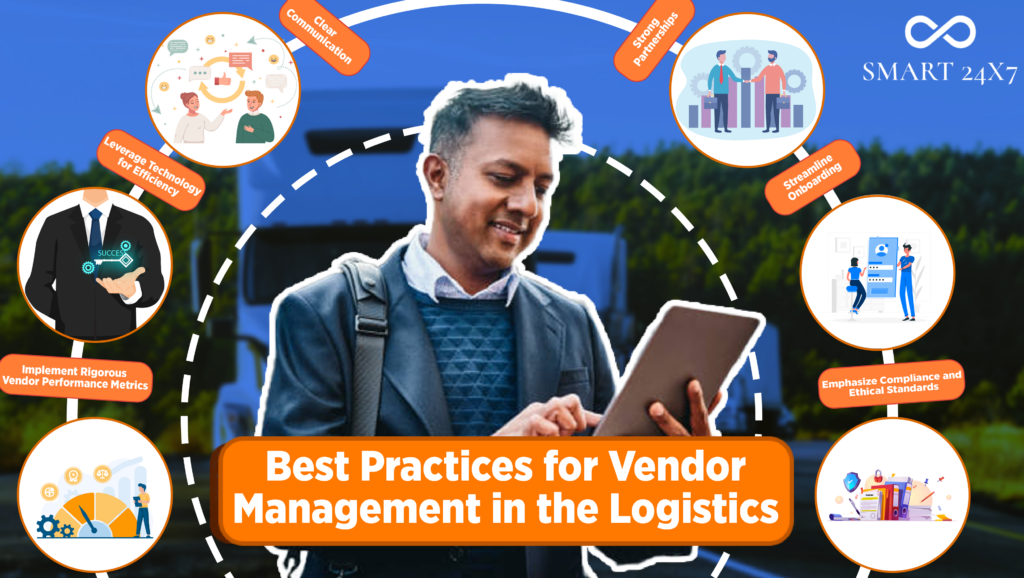In the logistics industry, effective vendor management is critical to maintaining a seamless supply chain and ensuring the timely delivery of goods. At Smart24x7, our SaaS-based logistics platform is designed to streamline and enhance vendor interactions, making them more productive and mutually beneficial. Here, we outline some of the best practices for vendor management in logistics that can help companies optimize their operations.
Establish Clear Communication Channels
Effective communication is the backbone of successful vendor management:
- Regular Updates: Keep vendors informed about changes in demand, inventory levels, and delivery schedules to prevent any disruptions.
- Transparent Processes: Ensure that all processes and expectations are clearly defined from the onset to avoid misunderstandings and delays.
Leverage Technology for Vendor Management:
- Integrated Communication Tools: Use platforms that facilitate real-time communication and document sharing, like Smart24x7’s vendor management system.
Develop Strong Partnerships in Vendor Management
Mutual success is key to building long-lasting relationships in vendor management:
- Collaborative Planning: Work together with vendors to forecast demand more accurately and plan resources effectively.
- Performance Incentives: Consider reward systems for vendors who consistently meet or exceed vendor performance metrics, encouraging continual improvement.
Foster Trust:
- Honest Feedback: Provide constructive feedback regularly to help vendors understand your expectations and areas for improvement.
- Conflict Resolution: Establish clear protocols for resolving disputes to maintain a positive working relationship.
Implement Rigorous Vendor Performance Metrics
Quantitative and qualitative metrics are crucial for assessing vendor performance:
- Service Level Agreements (SLAs): Define specific metrics such as delivery times, product quality, and compliance rates.
- Regular Evaluations: Conduct performance reviews at defined intervals to discuss achievements and areas for improvement.
Data-Driven Insights:
- Utilize Analytics: Leverage data analytics to track vendor performance metrics and identify patterns that may affect supply chain efficiency.
Streamline Onboarding and Training
A systematic approach to onboarding enhances vendor performance from the start:
- Standardized Procedures: Develop a standard onboarding protocol that includes training on your company’s systems, processes, and quality standards.
- Resource Availability: Ensure that vendors have easy access to necessary documents and training materials, ideally through a centralized vendor management system like Smart24x7.
Emphasize Compliance and Ethical Standards in Vendor Management
Regulatory compliance and ethics cannot be compromised in vendor management in logistics:
- Compliance Checks: Regularly verify that vendors adhere to industry regulations and company policies.
- Sustainability Practices: Encourage vendors to adopt environmentally friendly practices and sustainability in their operations.
Ethical Operations:
- Code of Conduct: Require vendors to agree to a code of conduct that aligns with your company’s ethical standards.
- Regular Audits: Conduct audits to ensure compliance with the code of conduct and address any deviations promptly.
Leverage Technology for Efficiency in Vendor Management
Technology can greatly enhance vendor management processes:
- Automated Systems: Use automated tools for procurement, inventory management, and payment processes, reducing manual errors and saving time.
- Real-Time Tracking: Utilize systems that offer real-time visibility into the logistics chain, allowing for better coordination and management.
At Smart24x7, we understand that robust vendor management is essential for the efficiency and reliability of logistics operations. By adopting these best practices, companies can build stronger relationships with their vendors, leading to improved service quality and operational efficiency. Our platform supports these endeavors by providing the tools necessary to manage vendor relationships effectively, ensuring that both parties are aligned and can achieve mutual success.
